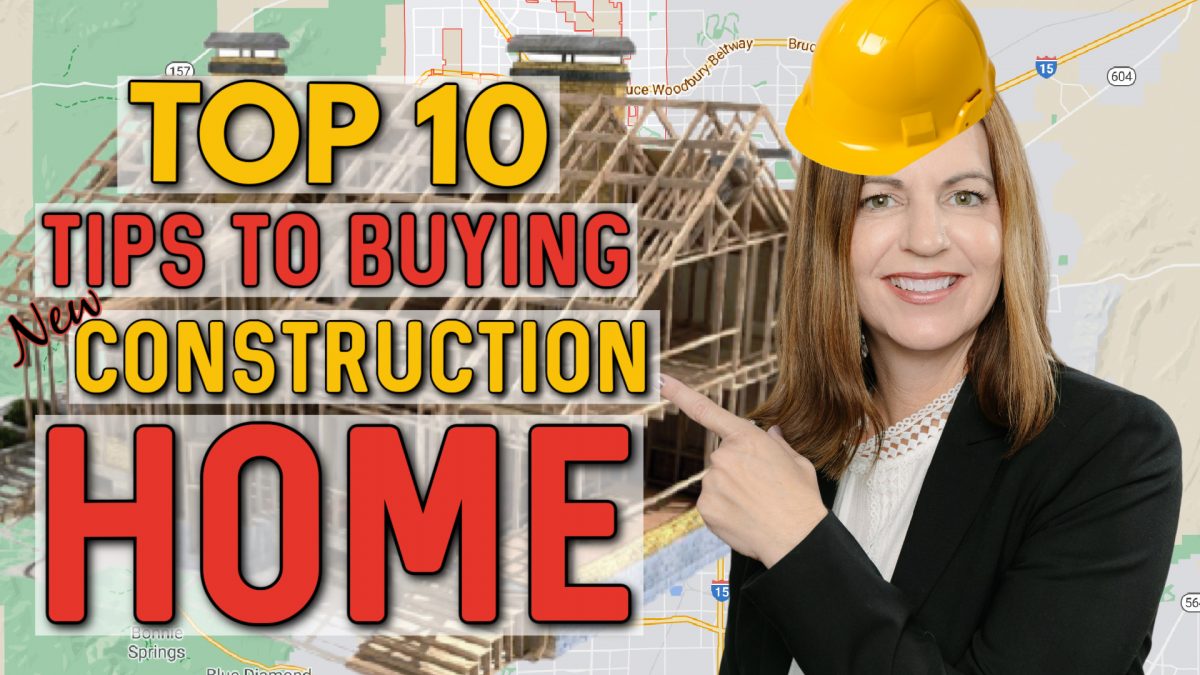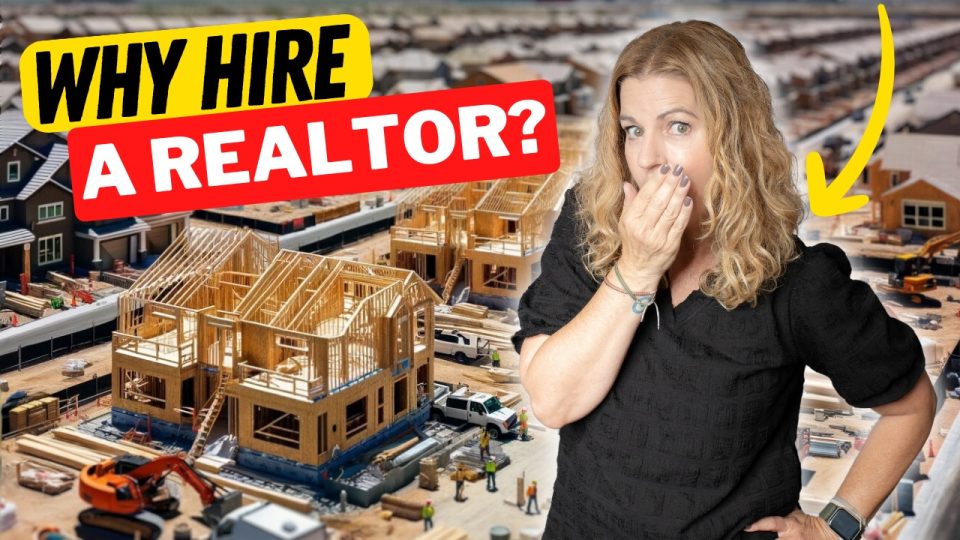
Las Vegas Real Estate Market Update – August 2021
August 10, 2021
New Construction Homes COMING SOON to Summerlin – 2021
September 13, 202110 Tips to Buying a New Construction Home


10 Tips When Buying a New Construction Home
10 Tips to Buying a New Construction Home: Thinking of buying a new construction home? They come with a lot of perks, like energy efficiency and no worn-down parts in need of repair—plus, you can make it exactly the way you want it. But there are few things to think through when it comes to new construction, like budget and timing.
Here are a few of the big things to consider when deciding if new construction homes are right for you.
Tip 1: Weigh the Pros and Cons
Nothing beats the feeling of being the first person to live in a newly-built home. Everything is shiny and untouched.
You can buy a brand-new home in one of three ways: buying a house already built on spec; having a semi-custom home built as part of a development (you can choose from a set palette of finishes and upgrades); or having a purely custom home designed and built to your specifications.
But before you get caught up in the sparkling new paint and granite countertops, evaluate your situation and see if new construction fits your lifestyle. Here are some questions to ask yourself, particularly if you fall within the first two methods of new-home buying:
- New homes are typically far from the city center; will you mind the commute?
- Will the cookie-cutter nature of new subdivisions drive you bonkers?
- New houses tend to be built right on top of each other. Do you mind the closeness and potential lack of privacy?
Tip 2: Get your own agent and lender
Buying new construction is like any home purchase: you need a team with your own interests at heart. Research, interview, and hire your own real estate agent, and apply to multiple mortgage lenders to find the best deal, just like you would with an existing home purchase.
Remember, the listing agent works for the builder, not for you. They’re trying to hit a quota, not help you make the right decision for you and your family.
If you have your own agent, tell them up front that you’re interested in looking at new homes. They must accompany you on your first visit to any new subdivision; if they don’t, then they will not be able to represent you at all.
Builders often have an agent on site and preferred lenders, and it’s not uncommon for them to suggest buyers just use their team. But it’s good to do your own research. A builder’s lender may offer you incentive money, but an outside lender may charge you less in points—which means bigger savings over the life of your loan.
Tip 3: Research the Builder and Neighborhood
You want to make sure the builder you’re considering delivers a high-quality product to satisfied customers. A great way to verify this is by making sure they’re in good standing with your state’s Construction Contractor’s Board. Also, check to make sure there are no pending judgments or disciplinary actions taken against the company. Pouring through online reviews left by real people is also helpful.
Don’t be afraid to check out the neighborhood on an intimate level. Visit the community at different times of day and talk to actual residents.
When researching neighborhoods:
- Look online for listings for new home construction.
- Drive around the neighborhood and check out the amenities and the quality of the homes.
- Walk the community. Ask homeowners about their experience.
- Go to model open houses, keep a journal and take photographs. Don’t try to cover every model house in the area in one day.
- Check with the developer about potential homeowners’ association (HOA) fees and rules; some are incredibly expensive — and strict. They may not allow storage sheds, certain paint colors or finish materials, solar panels or even vegetable gardens. Be sure to find out if the HOA can assess penalties for infractions.
- Research the zoning laws for the neighborhood, as they can change quickly.
- Visit the city planner’s office to see what’s in store for a particular location.
- Ask your agent about plans for the area.
Tip 4: Be aware of new construction timing
Besides cost, another factor to consider when choosing a customization option (and whether to go with new construction at all) is timing. Overall, the timeline for building a home can be unpredictable, because of weather, vendor delays, and waiting for logistics like permit approvals to happen.
On average, building a home can take from five to seven months, depending on size, but it’s not uncommon for it to take nearly a year if any delays happen along the way.
If you’re considering new construction, choose the build option that fits with your current living situation. If it’s flexible enough to allow for a lengthy—and potentially unpredictable—lead time, building from the ground up might be for you. If not, a semi-custom or built-on-spec home could be a better choice.
Tip 5: Don’t expect price reductions
Yes, it does happen. But overall, remember that Builders, etc., have established a set of prices that they feel best makes their product (the houses) marketable with an expected profit margin. Furthermore, lowering the price on a house drops the comparable value of other houses in the community, thus bringing the entire suite of houses down in price.
Typically, a pre-sale home … one that has not yet been built … will be slightly higher in price than a home that the builder erected as a “spec” house – one that was built to attract Buyers to the site. Note also, that very often homes that have not sold for a period of time will not drop in price – they actually go up in price at a new home development, thus supporting the builder’s position that materials and labor costs increase.
Tip 6: Know What’s Standard and What’s Extra
Ask the builder about amenities and upgrades. Amenities are features that benefit the entire community like a clubhouse, health and fitness center or a gated entrance. Upgrades refer to added features or items you pay extra for to enhance your home, like certain types of flooring or appliances.
Get a feature sheet on the line of homes you’re interested in and read them very carefully, then compare feature to feature. Find out what comes with the base home price.
If you don’t understand exactly what the builder is offering, ask and take notes. There are no dumb questions. Not knowing can cost you real money. Some things to keep in mind:
- If the stove is included, visit the showroom to see the model. If you’re offered the basic stove and you’re a gourmet cook, it makes sense to buy the upgrade.
- Make decisions on upgrades early in the process — every change costs money.
- Have a good idea of what you need and want. They are two different things when it comes to upgrades.
- Builders rake in the cash on upgrades because they can get parts and labor relatively cheaply. The markup is huge, so investigate each option you’re considering to see whether it would be cheaper to bid it out after you move in.
Tip 7: Keep resale value in mind when selecting upgrades
It’s a smart idea to keep the future value of your home in mind when selecting new construction upgrades. Certain upgrades will significantly improve the value of your home in the future. You should request a price list of all upgrades offered upfront to see how they fit into your budget. Here’s what you should focus on:
It’s hard to go wrong with upgrading your kitchen. Almost any Realtor will tell you that the kitchen remains one of the most cost-effective places to upgrade. It’s viewed as the “heart” of the home and homebuyers give its appearance considerable weight. Don’t worry about extras that you can upgrade yourself later, such as high-end appliances. Instead, go for upgrades that provide your kitchen with strong fundamentals, like taller cabinets, a kitchen island, and upgraded countertops.
Upgrading the ceiling height is also a no-brainer. It’s an upgrade that will make your home feel much more massive and grandiose to potential homebuyers in the future. Also, it’s a structural upgrade that will be very difficult to change after your home is constructed.
Generally, you want to try to focus on structural improvements that would be expensive or impossible to add later on. I’d recommend diverting money away from upgrades that can be easily accomplished at a later point in time or are purely aesthetic.
Be careful about over-improving, too. There can be a negative impact on your home’s future value if it’s upgraded beyond any other house in the neighborhood. You’ll end up pricing your own home out of the neighborhood and will ultimately need to significantly reduce the price in order to find a buyer.
Tip 8: Pick a great lot
The lot you choose for your home can impact your quality of life and the future resale value of your home. Below are some things to keep in mind when selecting your lot:
- The most desirable lots are those with a view and privacy. Expect to pay a considerable premium for these lots.
- Consider where the sunlight will be at different times of the day. Do you want a romantic sunset over your backyard? Or a sun-filled kitchen in the mornings?
- What will the traffic be like? Corner lots may seem attractive but they’re exposed to more traffic.
- Think about your lot in the future. Will you still have the same view in 5 or 10 years? Will future home buyers find the positioning of the home as convenient?
Tip 9: Know your warranty
Warranties are an excellent way for builders to guarantee the quality and craftsmanship of their homes. State law often requires a certain level of warranties but many builders offer coverage beyond what’s minimally required.
Usually, comprehensive warranty coverage implies that the builder has high confidence in their product and practices. It’s important to understand what the warranty covers and what the process of initiating claims is like before purchasing the home.
If you want to get the most out of your home warranty, it’s recommended that you get another inspection around the 11th month after you move in. Coverage on certain items typically begins to expire around the one-year mark, and some defects may only manifest after the house has had some.
Tip 10: Perform A Home Inspection
New construction home buyers need to realize that having a home inspection is still highly recommended. There are common issues that are regularly found during new construction inspections. Issues such as leaking plumbing, missing GFCI protected outlets, and exposed roof nails are a few of the most common.
While it’s not likely major issues are going to be present in a new construction home, having a home inspection on a new build is still suggested.
These top 10 new construction home buying tips are extremely important to be aware of if you’re thinking about building a new home. Building a new home requires a buyer to be very involved and buyers who follow these tips will greatly improve the chance that their experience is not only enjoyable but successful!
Why you should use a Realtor when Buying New Construction.
Also, if you are thinking about buying or selling in the Las Vegas Valley, CLICK HERE or you can call me at 702-370-5112.
Subscribe to our YouTube Channel:
Angela O’Hare
Favorite Las Vegas Realtor
Home Realty Center
Lic. #180246
702-370-5112
[email protected]
www.neighborhoodsinlasvegas.com


